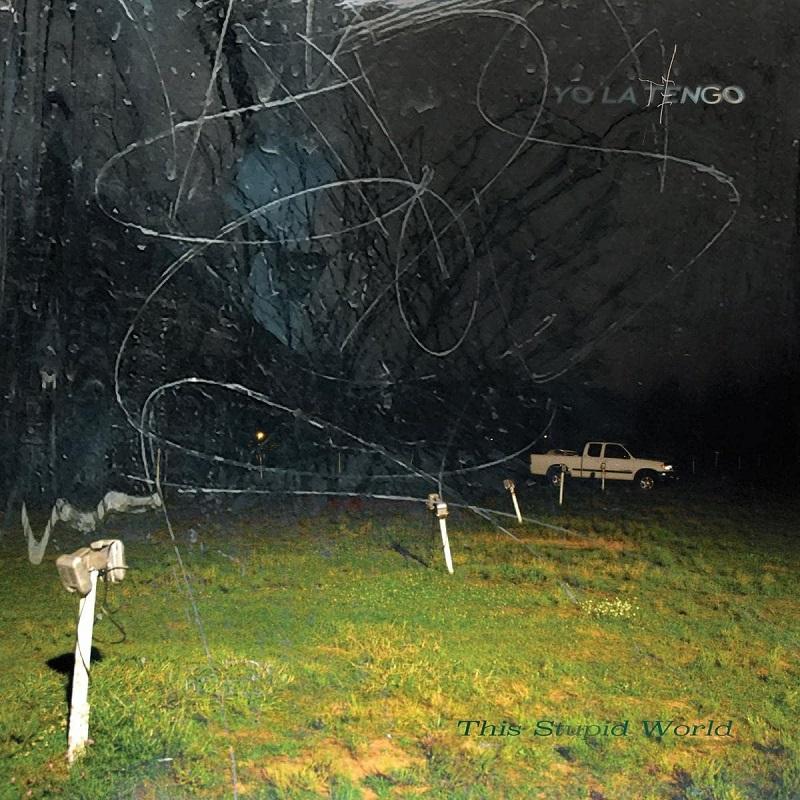
Yo La Tengo CONTINUE TO CHALLENGE WITH SOLEMN SONGCRAFT AND AUSTERE SOUNDS.
This Stupid World, the seventeenth album by Yo La Tengo, is being marketed as a follow up to 2018’s There’s a Riot Going On.
In fact, between then and now there was also 2020’s We Have Insomnia Sometimes, the band’s suitably idiosyncratic take on a pandemic diary: five tracks of wordless ambient droning with titles like ‘Georgia thinks it’s probably okay (Tuesday)’ and ‘James gets up and watches mourning birds with Abraham (Wednesday)’.
Despite running to nearly 40 minutes, We Have Insomnia Sometimes currently languishes in the EPs/singles sections of the band’s streaming pages — the eventual home of many an unloved and half-forgotten side project.
And yet its recording is key to understanding why This Stupid World sounds the way it does: Yo La Tengo had to learn how to get their desired sound in the studio without the aid of outside producers.
Opening track Sinatra Drive Breakdown is perhaps the most successful example of the band’s current approach to composition through spontaneous (mostly) live recordings.
Sinatra Drive is a road that stretches along the eastern coast of Hoboken, NJ where Yo La Tengo’s husband and wife team of Ira Kaplan (vocals, guitars, keyboards) and Georgia Hubley (vocals, drums, keyboards) grew up, met and live together to this day.
One can assume, therefore, that the song was inspired by a first – or second – hand recollection of a car accident or roadside emergency. The listener is not given details as to what happened on that long stretch of road overlooking the Hudson River; instead, the song explores its subject’s resulting existential anguish.
The breakdown is ultimately mental rather than vehicular, and it is through pure musical expression that its effects are conveyed to the listener.
Over 7-and-a-half nervy minutes of James McNew’s pulsating bass and Hubley’s doggedly featureless drumming, Kaplan improvises a series of admirably unhinged guitar phrases that recall the most electrifying of Neil Young’s famed guitar freakouts.
The freewheeling spirit of the piece is such that, even after three or four listens, one is unable to predict where it will lumber off to next.
Fallout — a crunchy, guitar-led anthem of defiance that will likely prove a hit with causal fans — ushers in a procession of songs that are less dissonant and more identifiably indie pop (British Invasion hooks, muted dynamics and mood, and on average around four minutes long).
Aselestine drifts dreamily by on a bed of synth washes, airy twangs of slide guitar and wholesome acoustic fingerpicking, with Hubley (like a more tuneful Nico) paying tribute to a mystery figure who may or may not be dead or dying. Again, details are scarce, but emotion rings out clear enough. This time it’s bittersweet, laced with longing for times gone by.
Apology Letter is more direct, and even lovelier. Utilising the songwriting trope of stylising lyrics as if they had been lifted straight out of a correspondence, Kaplan conducts a post-match analysis of an unspecified interpersonal conflict.
As ever Yo La Tengo commit fully to the concept, and Apology Letter gains a heartfelt quality because of that. It is also quite amusing, even as it confronts dark truths about human behaviour.
Less substantial but still enjoyable are Tonight’s Episode and Until It Happens. The former is a jittery dirge with a lyric that retreads John Lennon’s Watching The Wheels before veering unexpectedly into absurdist humour.
The latter is every bit the work of a band of advancing years, remarking bitterly on how time has its way with of all of us in the end.
Neither song sounds like its lyrics belong with their respective tunes, but the band’s performances are competent enough so that we don’t notice too much the deficiencies of the material.
However, in the end, and specifically because of how it ends, this is an album that feels less than the sum of its parts.
Like The Cure did on their 1989 masterpiece Disintegration, Yo La Tengo open and close their album with ambitious, sprawling ‘statement’ songs, with more self-contained and accessible material clustered in-between.
But whereas the material on Disintegration was consistently good throughout, This Stupid World runs out of tunes in its final third.
Two directionless noise pieces (the worst of which is the interminable title-track — a gross example of sound and fury, signifying nothing) all but eviscerate the momentum that has accrued across the rest of the album.
Although the sweetness of closing track Miles Away claws some good feeling back, its shallow catharsis cannot sustain seven-and-a-half minutes.
It is not the masterpiece that fans have waited five years for then, but This Stupid World is still a worthwhile entry into Yo La Tengo’s discography, and they deserve credit as a band for their continued commitment to developing their recording practices.
Some of the sounds they capture on record are extraordinary and, on a good day, the songs are too.



